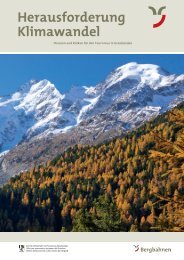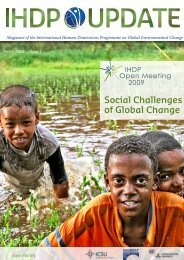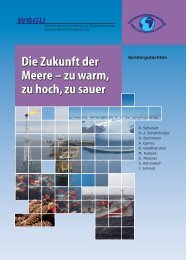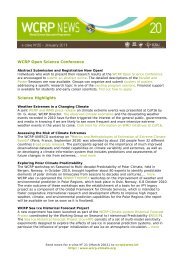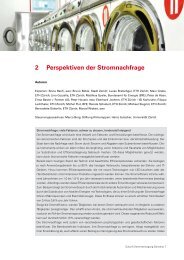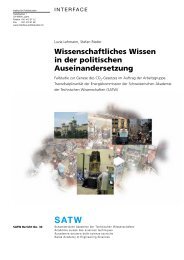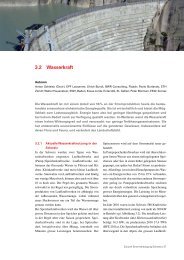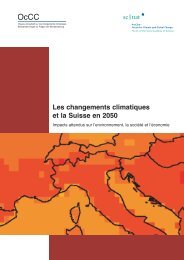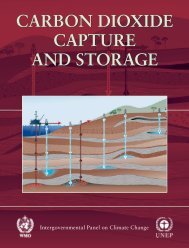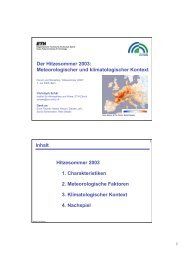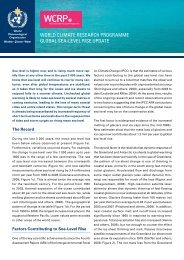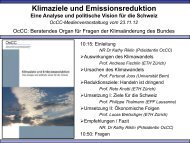Climate Change and Switzerland 2050 - OcCC - SCNAT
Climate Change and Switzerland 2050 - OcCC - SCNAT
Climate Change and Switzerland 2050 - OcCC - SCNAT
Create successful ePaper yourself
Turn your PDF publications into a flip-book with our unique Google optimized e-Paper software.
90 <strong>Climate</strong> <strong>Change</strong> <strong>and</strong> Switzerl<strong>and</strong> <strong>2050</strong> | Tourism<br />
Glacier retreat not only means the loss of an<br />
important attraction to many winter sport<br />
regions but also, particularly in summer, a<br />
restriction on offerings of glacier activities. The<br />
melting permafrost poses a further threat to<br />
certain mountain railways. Infrastructure that<br />
is anchored in the permafrost ground may be<br />
destabilised by variations in temperature. Since<br />
the foundations of pylons <strong>and</strong> stations of mountain<br />
railways as well as of avalanche barriers are<br />
anchored in the frozen loose rock, the necessity<br />
for costly rebuilding of the foundations<br />
increases. The melting permafrost also means<br />
an increasing risk of rockfall, l<strong>and</strong>slides <strong>and</strong><br />
mudflows, which again results in higher investments<br />
in safety <strong>and</strong> may lead to an increase in<br />
service interruptions.<br />
In warm summers with long periods of fine<br />
weather, the mountain railways may profit<br />
from the increase in mobility intensive daytrip<br />
<strong>and</strong> short-stay tourism. With appropriate<br />
adjustments, particular sports like mountain<br />
biking that are of relevance to mountain railways<br />
could gain in importance. Even new offerings<br />
for activities could be developed. However,<br />
only few mountain railways succeed in making<br />
summer business profitable <strong>and</strong> they cannot<br />
survive without a “good” winter.<br />
Accommodation<br />
In recent years, the number of hotels has decreased<br />
from 6300 (1992) to 5600 (2003). The number<br />
of beds has decreased only slightly within the<br />
same time period from 261,900 to 258,700. Even<br />
if certain concentration processes are under way,<br />
small hotels still dominate in Switzerl<strong>and</strong>. The<br />
economic situation of the Swiss hotel business<br />
is not a pretty picture. Often the profitability is<br />
insufficient, the capital gearing is too high <strong>and</strong><br />
the investment needs are large. The number of<br />
overnight stays in hotels also fell by about 14%<br />
between 1992 <strong>and</strong> 2003, from 36 to 31 million.<br />
While the number of guest arrivals increased<br />
slightly within this period, the average duration<br />
of stay decreased strongly. The booming secondhome<br />
tourism became a primary competitor to<br />
the hotel business in the Alps. The manifold problems<br />
of the Swiss hotel business are in the minority<br />
of cases directly related to climate change.<br />
While the hotel business offers about 260,000<br />
beds, holiday flats <strong>and</strong> second homes provide<br />
about 1.2 million beds. A further 430,000 beds<br />
<strong>and</strong> sleeping places are offered by youth hostels,<br />
group accommodation <strong>and</strong> campgrounds. The<br />
alpine area is a popular region for second homes<br />
<strong>and</strong> holiday flats. The number of second homes<br />
has increased enormously in recent years, which<br />
has brought with it various problems (infrastructure<br />
geared to peak loads, urban sprawl, poor<br />
capacity utilisation, rising prices for locals, etc.).<br />
About two thirds of the second homes <strong>and</strong> holiday<br />
flats in Switzerl<strong>and</strong> are occupied only a few<br />
weeks every year but are heated the entire winter.<br />
They therefore contribute considerably to CO 2<br />
emissions. In spite of the expected decrease in<br />
heating degree days from 98 (2004) to 85 (<strong>2050</strong>),<br />
energy consumption will continue to rise. In addition,<br />
there will be increasing dem<strong>and</strong> for cooling<br />
in summer (see Energy chapter, section 2).<br />
<strong>Climate</strong> change will affect the accommodation<br />
sector, in particular because of the changes in<br />
winter sports. In locations where winter sports<br />
are no longer a catalyst, the accommodation sector<br />
will experience massive slumps in dem<strong>and</strong>.<br />
On the other h<strong>and</strong>, settlement pressure <strong>and</strong> thus<br />
mobility as well will increase at prime locations.<br />
Since the Lex Friedrich (consent to property<br />
purchase by foreigners) will be abolished, some<br />
regions are trying to restrict the building of new<br />
flats using new measures. The dynamics of the<br />
second-home market are shaped by many factors,<br />
of which until now climate has played a minor<br />
role.<br />
<strong>Change</strong>s in the tourist attractions <strong>and</strong> in the<br />
l<strong>and</strong>scape will affect the attractiveness of a<br />
destination <strong>and</strong> therefore influence property<br />
prices. The potential for conflicts in new l<strong>and</strong><br />
development will grow due to the increased<br />
risk from natural hazards. The pressure on<br />
snow-reliable <strong>and</strong> easily accessible regions will<br />
increase. Insurance premiums <strong>and</strong> bank loans<br />
will tend to get more expensive because of the<br />
increased risks 9 (see Insurance chapter, section<br />
4). Altogether, the added value of tourism will<br />
decrease at certain places despite an increasing<br />
number of tourist beds. If tourist flow shifts seasonally<br />
<strong>and</strong> spatially, the accommodation sector<br />
will feel the effects, although not to the same



